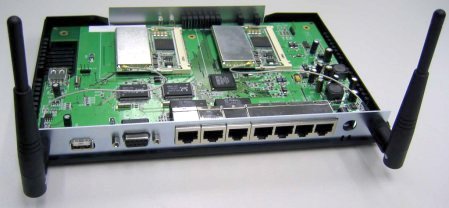How to build a Debian Linux router/server that draws just 3.1 Watts
May 16, 2005 — by Henry Kingman — from the LinuxDevices Archive — views A real-time signal processing consultant has posted a how-to on building a combination home router/server that draws just 3.1 watts, including AC adapter. PAMurray says the set-up, based on a Peplink Manga running Debian, saves power compared to a separate router and laptop-based server.
A real-time signal processing consultant has posted a how-to on building a combination home router/server that draws just 3.1 watts, including AC adapter. PAMurray says the set-up, based on a Peplink Manga running Debian, saves power compared to a separate router and laptop-based server.
The recommended setup is based on the Peplink Manga, a versatile ARM-based device that comes with Linux and can be configured with various options, including Bluetooth wireless, Wi-Fi, USB storage, upstream line load balancing, USB storage, and more. The setup uses a Flash disk rather than a hard drive, to further reduce power draw.

This Peplink Manga model shows options including multiple WAN ports, a four-port switch, and a wireless router
(Click to enlarge)
Peplink encourages users to hack its highly versatile and rather innovative devices, and distributes a free SDK (software development kit) with the Manga. The SDK can be used to install custom firmware in the device.
The how-to document published on PAMurray's website includes instructions for setting up the device to boot Debian Linux. It also discusses using the device as an X server for remotely hosted X applications, and setting up a development environment on the Manga (for those who don't want to set up the cross-platform development environment provided in the Peplink SDK).
The authors of the how-to conclude that the device will save about 17.8 kWh/month, when compared to using a separate LinkSys router and a power-efficient x86 laptop.
The article can be found here. A PepLink-sponsored user forum devoted to the topic is also available, here. An in-depth look at the Peplink Manga can be found here.
This article was originally published on LinuxDevices.com and has been donated to the open source community by QuinStreet Inc. Please visit LinuxToday.com for up-to-date news and articles about Linux and open source.